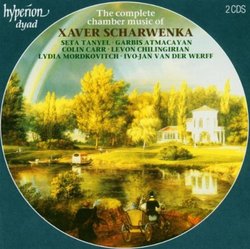| All Artists: Scharwenka, Tanyel, Atmacayan, Carr, Werff Title: Chamber Music Complete Members Wishing: 1 Total Copies: 0 Label: Hyperion UK Release Date: 12/10/2002 Album Type: Import, Original recording reissued Genre: Classical Styles: Chamber Music, Historical Periods, Classical (c.1770-1830) Number of Discs: 2 SwapaCD Credits: 2 UPC: 034571120461 |
Search - Scharwenka, Tanyel, Atmacayan :: Chamber Music Complete
CD Details |
CD ReviewsOBSCURITY GEORGE RANNIE | DENVER, COLORADO United States | 03/12/2007 (5 out of 5 stars) "Polish composer Francis Xaver Scharwenka is perhaps best known (if at all) for some wonderful piano concertos. For the most part, he, (as a composer), has sunk into obscurity. This 2 disc set at a bargain price from Hyperion with Scharwenka's complete chamber music certainly proves that he along with his chamber works don't deserve to be in total obscurity. I found the works to be splendidly harmonious and melodic being some lovely romantic works that sound very much like late Mendelssohn and/or early Brahms. The album consists of 3 piano trios; Sonatas for piano and violin and cello, a Piano Quartet and a very late Serenade for violin and piano that is lovely. The Piano Quartet is full of wonderful melodies and harmonies with each instrument allowed a chance to really "shine" not just the piano as perhaps might be expected due to the fact that Scharwenka was a well known pianist. It is an achingly GORGEOUS work that deserves to be heard more often! I especially adored the Sonata in D minor for violin and piano. It reminded me a lot of Mendelssohn being filled with "catchy" melodies, rhythms and harmonies. The performers on these two discs sound as if they are very committed playing with wonderful tone and spirit. The recorded sound is great too! If you love romantic chamber music, as I do, you really can't do much better than these discs. " Fine Chamber Music in the Mendelssohn-Schumann-Brahms Style J Scott Morrison | Middlebury VT, USA | 01/11/2005 (5 out of 5 stars) "This Hyperion Dyad twofer was originally published as two separate discs in the mid-1990s. It is now available at mid-price and worth every penny, at least for those who can't get enough of well-made 19th-century chamber music partaking of the kind of procedures made familiar by that arc that goes from Schubert through Mendelssohn and Schumann and culminating in Brahms. Not bad company to keep, I assume most would agree.
The two discs comprise five works--all that Scharwenka ever wrote--from his Opus 1 Piano Trio No. 1 to his late Serenade for Violin and Piano, Op. 70. Scharwenka was a piano virtuoso and each of the works includes a piano part, played here with real musicianly subtlety, grace and brio by the very fine Turkish pianist Seta Tanyel, who has made lauded recordings of much of Scharwenka's solo piano music for this label. The two earliest pieces--the Piano Trio, Op. 1, and the Violin Sonata, Op.2--were written while he was still a student at Theodor Kullak's Neue Akademie der Tonkunst in Berlin, at age 19. They are distinguished by meticulous craftsmanship, Mendelssohnian lightness, confident counterpoint and memorable melodies. The Piano Quartet in F major, Op. 37 is altogether more advanced, although still in a conservative Romantic language. It sounds more like Schumann or even early Brahms, with gorgeous melodies, formal precision and utterly seamless voice-leading and counterpoint. The second movement Adagio is a 12-minute meditation that is clearly influenced by late Beethoven slow movements. It is followed by a fleet and light third movement that makes one think again of Mendelssohn's fairy music. In the rumbustious final movement there are hints of Brahmsian Hungarian Gypsy fireworks. The Second Piano Trio, Op. 45, is also an advance on its earlier sibling. Again the Adagio is placed second and is followed by a scherzo that Brahms might have been proud of; there are also some features that remind me of the scherzi in Schubert's two piano trios. This is good stuff! The most substantial work here is the Cello Sonata in E minor, Op. 46a, a three-movement work that moves further into high Romantic territory. Perhaps because Rachmaninov wrote such a glorious cello sonata I'm reminded of it, but this is not too far afield. Colin Carr, the cellist, has a really big juicy Rostropovian tone, digging deep into the strings when required. Tanyel is his worthy partner, as she is in all these works. She is also a generous colleague in that she never allows the piano to overshadow the strings, as it so often can, Carr's cello or, in the other works, Lydia Mordkovitch's violin, Levon Chilingirian's violin and Ivo-Jan van der Werff's viola. These, if you perhaps weren't aware, are absolutely first-class instrumentalists who have brought us many fine performances over the years. The latest piece, Serenade for Violin and Piano, Op. 70, written in 1895 while Scharwenka was in New York running a branch of his Berlin conservatoire, is in a way the least substantial of any. It is played with meltingly beautiful tone by Mordkovitch. The 'Serenade' is an eight minute bauble in three-part song-form that partakes more of the salon that the recital hall. For all that, though, it is gently lyrical in its outer sections and more dramatic in the B section. Martin Eastick, who is something of an expert on this composer and indeed supplied all the scores and parts for the instrumentalists, supplies altogether too brief notes but I can endorse his final comment, 'Their revival after so many years of unjust oblivion is long overdue.' CD1=76'28" CD2=76'11" Heartily recommended for anyone who loves Austro-German chamber music from the heart of the Romantic period. Scott Morrison" |

